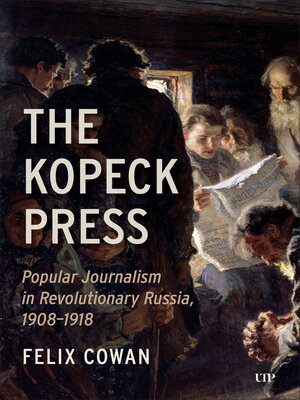
Sign up to save your library
With an OverDrive account, you can save your favorite libraries for at-a-glance information about availability. Find out more about OverDrive accounts.
Find this title in Libby, the library reading app by OverDrive.



Search for a digital library with this title
Title found at these libraries:
| Library Name | Distance |
|---|---|
| Loading... |
The Imperial Russian penny press was a vast network of newspapers sold for a single kopeck per issue. Emerging in cities and towns across the empire between the 1905 Revolution and the onset of the First World War, these sensational tabloids quickly became the Russian Empire's most popular periodical genre. They appealed to a mass audience of poor and less-literate readers with their low prices and accessible language.
The Kopeck Press presents a comprehensive study of this phenomenon, examining its role both as a media genre and its significance as a vital forum for lower class political culture. Drawing on over seventy kopeck newspapers from thirty locations, Felix Cowan analyses these publications as a dialogic genre, emphasizing the interaction between journalists and readers. The book highlights how sensationalism was strategically used to advance the political goals of progressive journalists, editors, and publishers. As a genre of political media, the kopeck press revealed a moderate reformist current in Russian politics, aimed at democratizing the empire and empowering marginalized groups, significantly contributing to the political and cultural foundations of the Russian Revolution. The Kopeck Press sheds light on the crucial role of popular media in shaping public discourse and mobilizing political change in early twentieth-century Russia.
The Kopeck Press presents a comprehensive study of this phenomenon, examining its role both as a media genre and its significance as a vital forum for lower class political culture. Drawing on over seventy kopeck newspapers from thirty locations, Felix Cowan analyses these publications as a dialogic genre, emphasizing the interaction between journalists and readers. The book highlights how sensationalism was strategically used to advance the political goals of progressive journalists, editors, and publishers. As a genre of political media, the kopeck press revealed a moderate reformist current in Russian politics, aimed at democratizing the empire and empowering marginalized groups, significantly contributing to the political and cultural foundations of the Russian Revolution. The Kopeck Press sheds light on the crucial role of popular media in shaping public discourse and mobilizing political change in early twentieth-century Russia.







